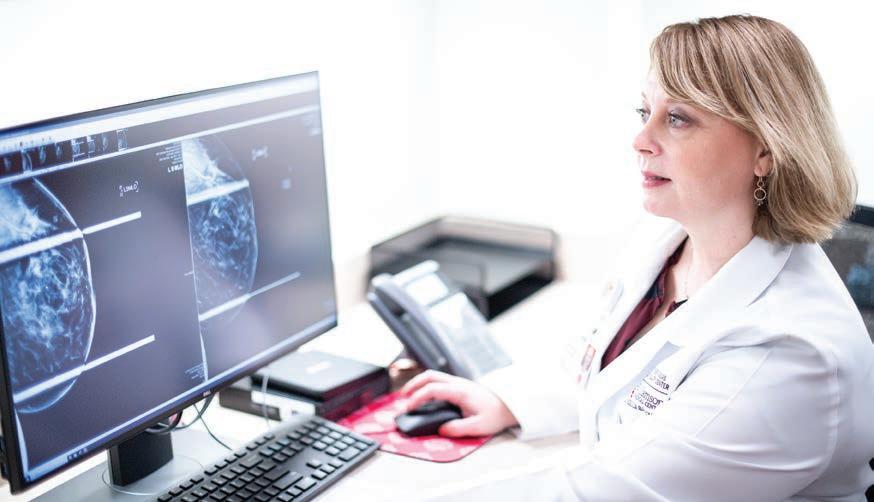
4 minute read
ROUTINE MAMMOGRAMS CAN SAVE YOUR LIFE
TOP PHOTO: Dr. Rebecca Baskin, M.D., breast surgeon and breast health specialist a The Turner-Dugas Breast Health Center at Williamson Medical Center
For Jessica Strain, Williamson Medical Center’s (WMC) Turner-Dugas Breast Health Center wasn’t just a nice option for routine screenings. It was a lifesaver. Strain started having mammograms at age 40 and had undergone two recommended biopsies, both of which came back benign.
Advertisement
In 2021, she put off the recommended six-month post-biopsy screening for so long that it was almost time for her yearly mammogram. To save her time, the technicians went ahead and scheduled a screening for both breasts. “That’s when they found my cancer, in the breast that hadn’t been biopsied,” Strain said. “It was one of the fastest growing types of cancer, grade 3. Early detection made all the difference for me.” Thankfully, after being diagnosed in October 2021, Strain underwent a mastectomy last December and is now cancer-free.
The Turner-Dugas Breast Health Center, recognized nationally as a center of excellence by the National Accreditation Program for Breast Centers, offers expert procedures and screenings with a personal touch. Using state-of-the-art technology, the Breast Health Center offers advanced screenings and diagnostic mammograms as well as breast MRI, breast biopsies, and more. “One of the things that set us apart is our focus on minimizing the delay from screening to diagnosis to intervention,” said Lanesia Johnson, outpatient imaging manager. “Our goal is to move to intervention within 30 days of the abnormal screening.”
For those who have experienced an abnormal screening or been diagnosed with breast cancer, the Turner-Dugas Breast Health Center isn’t only a resource. It is a full-service imaging center and offers routine screenings such as mammograms as well as 3D mammograms to all patients.
The Breast Health Center abides by NCCI guidelines, which recommend patients with normal risk begin mammograms at age 40. If a patient is at greater risk of developing breast cancer, routine screenings should start earlier. “If an immediate relative — mom, grandmother, sister or daughter — has developed breast cancer, there are recommendations that support an at-risk patient have their first mammogram 10 years prior to when their immediate family member developed breast cancer,” Johnson explained. “So, if their mother or grandmother was diagnosed at age 45, that patient would want to have a mammogram at 35.”

PHOTOS COURTESY OF WILLIAMSON MEDICAL CENTER
During the pandemic, many people delayed routine screenings such as mammograms, especially if they considered themselves at low risk for developing cancer. It’s a trend Johnson said they’ve noticed at the Breast Health Center. “Within the last year or so, we have seen patients who delayed or skipped screenings,” Johnson said. “Right now, we are seeing more patients being diagnosed with advanced disease and lymph node involvement. It’s important to have annual screenings because things can change in the breast rapidly.”

PHOTOS COURTESY OF WILLIAMSON MEDICAL CENTER
The medical providers at Williamson Medical Center’s Breast Health Center seek to offer patients the best care available. When breast cancer is detected, the breast health staff follows the gold standard of care, following up with an MRI. To help identify all instances of disease, physicians may also use ultrasound as an additional tool. “With MRI, we’re looking to make sure there’s no evidence of disease that’s so early it may not be picked up by mammogram or ultrasound,” Johnson said. “We are finding so many patients who have instances of contralateral breast cancer in the other breast that is so small it would not be detected by mammogram.”
As October is Breast Cancer Awareness Month, Johnson and Strain urge women not to put off their annual mammograms. “My story would have been drastically different if I had waited a few months,” Strain said. “We may think screenings like this are a hassle but be grateful that we live in a time and place where we have access to these types of screenings.”
Williamson Medical Center’s Turner-Dugas Breast Health Center offers personalized, convenient care from experts. To schedule your mammogram or learn to learn more about the Turner-Dugas Breast Health Center at WMC, visit WilliamsonMedicalCenter.org.








